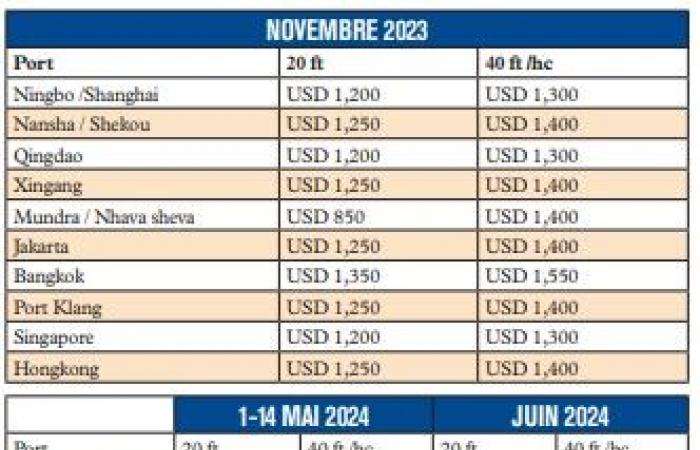Maritime transport costs, amplified by geopolitical tensions and logistical disruptions, will continue to weigh on the cost of living in Mauritius. Recent attacks by the Houthis (an armed group belonging to a branch of Shia Islam, Zaydism, widely spread in Yemen) have seriously disrupted transit through the Red Sea, a key shipping route linked to the Suez Canal, which handles between 10 and 15% of world trade. This situation has intensified the challenges for global supply chains, leading to an increase in freight rates (price of transporting goods) since May, which has been maintained until today. Comparing the data from November 2023 to June 2024, the drastic increase in freight prices can be seen (see comparative tables for November 2023 and May/June 2024 opposite) – source: Association of Freight Forwarders Professionals).
“The maritime industry is facing a multitude of problems. And this is likely to continue for some time. In the best case scenario, we expect a return to normal around the beginning of August. In the worst case scenario, it could be February 2025.”believes Yousouf Delbar, spokesperson for the Association of Freight Forwarders. This increase in freight prices adds to the burden on consumers. The increase in freight costs is already reflected in the already high prices. At the same time, the devaluation of the Mauritian rupee means that importers have to pay more in rupees to import consumer products. For comparison, between June 2022 and June 2024, it costs Rs 2.49 more to buy one US dollar. This represents a depreciation of the rupee of 5.48% against the US dollar (see table).
Thus, on the point of sale side, it is observed that no less than 90% of consumers suffer from these constant increases. “There are three categories of customers: those who do not consider price (in the minority), those who reduce their usual purchases like Kraft cheese for cheaper brands, and those who experience constant difficulties and cannot even buy essential products in sufficient quantity”cites as an example Yusuf Sambon, director of Lolo Hypermarket and importer.
In addition to the increase in prices, a shortage of certain products is notable on the market. Shipping line diversions due to disrupted transit through the Red Sea mean ships have to take much longer routes. This disruption is causing congestion in the ports of Singapore, Malaysia, Shanghai in China and Barcelona in Spain, we can read in the international press. This not only causes delays but also cancellations of planned ship departures.
These delays in the arrival of ships, causing delays of two to three weeks or even a month, create a shortage of certain products which are therefore out of stock on the market, underlines Yusuf Sambon. “We can stock up for two to three months, but not for six months. We cannot commit that much cash. Moreover, with thousands of imported products, we are short of storage space.” Furthermore, the importer emphasizes that the biggest problem lies in the lack of foreign currency. “We are not receiving the necessary amounts in requested currencies. This affects us because we need foreign exchange to pay for our products. When we can’t make these payments, our suppliers judge us differently. This problem affects all levels.”







